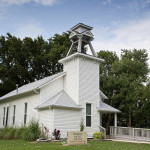 Randy McCarthy gave several references to Jesus being prophesied in the Old Testament including Jeremiah chapters 1 & 22, 2-Kings chapter 22, and Daniel chapter 9.
Randy McCarthy gave several references to Jesus being prophesied in the Old Testament including Jeremiah chapters 1 & 22, 2-Kings chapter 22, and Daniel chapter 9.
 Allen Daniels spoke on the communion service.
Allen Daniels spoke on the communion service.
Podcast: Download (Duration: 34:56 — 11.0MB)



 By Elder Bill McCarthy
By Elder Bill McCarthy By: Elder Mark Wattenbarger
By: Elder Mark Wattenbarger